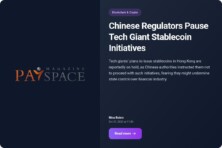Analysts say that the outlook for the growth of foreign direct investment in China is facing a new challenge amid the return of Donald Trump, who won the United States presidential election last month, to the White House.

According to media reports, citing experts, Mr. Trump’s intentions to raise tariffs on imported goods, including from an Asian country, threaten to significantly decrease the effectiveness of Beijing’s efforts to retain and gain overseas companies. It is worth noting that the likely tightening of Washington’s tariff policy will become a factor in increasing tensions in the global trade environment, which will affect many regions of the world.
The volume of foreign direct investment in China has decreased sharply since 2023 amid a switch by foreign business operators into the Asian country’s economic system after several years of steady upward trajectory.
Nick Marro, principal economist for Asia at the Economist Intelligence Unit, said that against the backdrop of Donald Trump’s hardline stance on China, overseas companies will keep repatriating their earnings from this country back to home markets.
The most likely short-term consequences of a decrease in foreign direct investment in China are a decline in tax revenues and a downward dynamic of employment indicators. At the same time, the deterioration of the situation in the context of external financial injections carries the risk of a significant slowdown in the progress of the Asian country’s technology sector in the long term. The corresponding assumption is based on a virtually historical fact, which is that foreign companies have traditionally been one of the main impulses in the implementation of China’s industrial modernization efforts. Experts interviewed by the media adhere to this forecast.
Data from the Ministry of Commerce of China indicate that from January to October 2024, the volume of foreign direct investment in the Asian country amounted to 693.21 billion yuan ($95.84 billion). This indicator decreased by 29.8% compared to the result for the first ten months of last year.
It is worth noting that from January to September 2024, the volume of foreign direct investment in China fell by 30.4% year-on-year. It is also noteworthy that external financial injections into the Asian country are still at a historically high level, despite the downward dynamic of the growth rate.
In 2022, the volume of foreign direct investment in China amounted to $189.1 billion. This figure is a record. In 2023, the volume of foreign direct investment in the Asian country decreased, amounting to $163.25 billion.
Foreign investors are currently showing concerns about the growth prospects of the Chinese economy, which is the second largest in the world. The gross domestic product (GDP) of the Asian country grew by 5.3% in the first quarter of 2024. However, in the third quarter, the rate of increase in this indicator slowed to 4.6%. In this case, there is a clear weakening of the momentum of economic growth. Another factor of concern for investors is the consistently increasing tension in the space of geopolitical relations. Further aggravation of the already formed situation in the mentioned space means a deterioration in the condition of cooperation between Beijing and the capitals of Western countries with non-minimal probability that the corresponding dynamic will cross the line at some point, beyond which the structural degradation of China’s interaction with the United States, the European Union and their allies will begin. In this context, it is worth mentioning that Washington has already imposed restrictive measures. The United States has limited the export of advanced chips and equipment needed to manufacture microcircuits of the appropriate category to China. Also, last week, the media reported that Washington is considering expanding the mentioned restrictive measures. The relevant actions of the United States are a barrier to the implementation of efforts to develop China’s technology sector. At the same time, it is likely that Beijing will overcome these difficulties and achieve a significant degree of technological sovereignty.
It is worth noting that amid fears of US sanctions, many foreign companies have already started redirecting production from China to Southeast Asian and Latin American countries. It is obvious that the corresponding process from the point of view of the growth prospects of the world’s second-largest economy in a symbolic sense is a path towards a future where gray and dark colors are the main ones, which has nothing to do with the palette of financial and industrial prosperity.
Nick Marro stated that foreign companies are big drivers of employment, local tax revenues, and local industrial economic activity. The expert also noted separately that an exodus of overseas investments may provoke concerns about the growth of unemployment.
By the end of 2022, the share of foreign businesses in the structure of all Chinese enterprises was only 2%. At the same time, the mentioned businesses at the specified time accounted for 20% of trade volume, over 16% of tax revenues, 20% of added value in industry, and roughly 10% of urban employment. The relevant data was published by the Ministry of Commerce of China.
Nick Marro noted that foreign businesses have historically played a big role in the Asian country’s efforts to modernize local industry. The expert also separately stated that although China is more innovating through its domestic companies, it still needs an overseas business to gain access to global production, talent, and research and development networks to achieve technological goals in the long term.
In 2022, 36.1% of foreign direct investments received by the Asian country went to high-tech industrial sectors. At the same time, 26.5% of the mentioned financial injections were directed to high-tech services and 9.6% to high-tech manufacturing segments. The specified investments in monetary terms amounted to $136.7 billion out of a total sum of $189.1 billion, according to the Ministry of Commerce of China.
Nick Marro noted that overseas companies have also played an important role in stabilizing China’s external relations. In the relevant context, the expert underlined that the business community has traditionally actively supported positive relations between Beijing and Washington. Nick Marro also noted that in the future, with their withdrawal, foreign investors are losing that voice to lobby their home government.
Hinrich Foundation analyst Stewart Paterson said that between 1996 and 2010, foreign companies contributed more than half of the value of Chinese exports. The expert warned that the Asian country could face the risk of becoming increasingly divorced from the growth in overseas supply chains if the current tendency towards declining foreign direct investment persists. Stewart Paterson stated that China’s centrality in the global supply chain occurred relatively quickly. According to the expert, the opposite can happen just as quickly if the Asian country turns out to be virtually isolated from foreign ideas, which drive its domestic technological advances and other spillover impacts of external financial injections on internal efficiencies.
The lack of foreign direct investment is also associated with Chinese authorities’ investigations into overseas firms. In this case, it is worth mentioning, for example, the review of US memory chip manufacturer Micron Technology last year under the pretext of national security considerations. Also, according to experts cited by the media, the lack of external financial injections is associated with a high level of market competition in the private sector of the Asian country, including, among other things, in the automotive industry.
Gary Ng, a senior economist at French investment bank Natixis, said it was difficult to expect a rapid recovery in foreign direct investment in China amid rising geopolitical uncertainty and a possible slowdown in interest rate cuts amid Donald Trump’s return to the White House.
Last week, Mr. Trump threatened additional disruptions to the global supply chains. He announced his intention to impose new tariffs on goods imported from China, Canada, and Mexico. Donald Trump plans to launch the implementation of the relevant intention in the practical plane on the first day of his administration in January.
Automakers such as Nissan, Volkswagen, and Infiniti have already scaled back or withdrawn some operations in China.
Gary Ng stated that the creation of jobs in the Asian country and the upgrade of the local industry may be slowed down due to companies trying to rebalance investments in China and the rest of Asia.
Data from the State Administration of Foreign Exchange indicates that net inflows of direct external financial injections into the Asian country in 2023 decreased to $33 billion from a peak of $344 billion in 2021. The figure recorded last year is the lowest in the past two decades.
Moreover, in the third quarter of 2023, Beijing faced the first direct investment liabilities deficit since the relevant data started being recorded in 1998.
A $11.8 billion deficit meant that investors’ money was leaving China as they repatriated profits to their parent companies based abroad rather than reinvesting these funds in domestic operations.
Beijing does not make any statements at the official public level about the problem of decreasing the volume of foreign direct investment. At the same time, Chinese officials have recently been unequivocally demonstrating their desire to gain overseas investors as part of their rhetoric. In the context of these efforts, Beijing focuses on references to China’s close cooperation with US companies such as Apple and Tesla. In particular, interaction with the specified brands was mentioned last week at the China International Supply Chain Expo.
The decline in foreign direct investment highlights the fact that, with a high degree of probability, against the background of the current version of the geopolitical conjuncture, which has signs of gradual transformation into a kind of long-term status quo, technological sovereignty and an independent or minimally driven by the factor of interaction with other countries economy are becoming increasingly relevant for Beijing.









